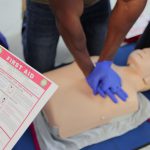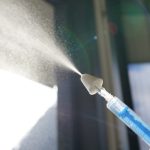UPMC donated $22,000 to the Allegheny County Sheriff’s Office to support the purchase of 20 automated external defibrillators (AEDs)— portable devices that deliver an electric shock to the heart during cardiac arrest or an irregular heartbeat, re-establishing a normal rhythm. The devices are stationed in Sheriff’s Office patrol cars and in “go bags” located in county buildings. The goal of UPMC’s partnership with the Sheriff’s Office is to increase accessibility to AED devices—ultimately increasing survival chances for cardiac arrest victims across the region.
“These AEDs are one of the most important parts of regional efforts to improve survival after sudden cardiac arrest. They enable non-medical first responders and laypersons to provide life-saving treatment before an ambulance arrives,” said Leonard Weiss, M.D., UPMC emergency physician and assistant medical director, Pittsburgh Emergency Medical Services (EMS). “When Sheriff’s deputies or other personnel can treat a patient minutes before an ambulance arrives, that patient may need far fewer subsequent treatments to survive.”
In 2007, Allegheny County Sheriff, William P. Mullen, suffered a cardiac arrest while playing basketball. Bystanders and first responders performed CPR, and resuscitated him with an AED, before he was transported to UPMC Mercy to undergo emergency surgery. His experience inspired the AED donation and the department’s advocacy for access and awareness of the devices.
“Thanks to an AED, my life was saved over ten years ago. Not a day goes by that I don’t remember how important it is to ensure these vital devices are accessible to as many people as possible,” said Sheriff Mullen. “Deputies travel extensive miles throughout Allegheny County on a daily basis and are often the first to the scene of emergency situations. The Sheriff’s Office will be better prepared to administer life-saving treatment to citizens in need throughout the region.”
According to the American Heart Association (AHA), nine out of 10 cardiac arrest victims will survive if an AED is used within the first minute of the emergency. Survival from cardiac arrest doubles when bystanders step in to use a publicly-available AED rather than waiting until emergency responders arrive. The AHA advocates that all EMS first-response vehicles and ambulances be equipped with an AED or other defibrillation device and supports placing AEDs in targeted public areas.
“We have 11 vehicles within 11 districts throughout the county and many times they are first responders. They’ll hear a call, they’ll back up a municipality, and they’ll be the first on the scene. If there’s a cardiac event they’ll be equipped to act immediately,” said Kevin Krauss, Allegheny County Chief Deputy.
UPMC and the University of Pittsburgh are involved with several other initiatives aimed at increasing the accessibility of AEDs and providing resources to help regular people administer life-saving care to cardiac arrest victims. The mobile app, PulsePoint, connects smartphone users with people in need of CPR, and a group called, ReLIVe, has donated AEDs to Pittsburgh area churches where there is limited availability of devices.
“There are anywhere from four to ten out-of-hospital cardiac arrests in our county alone, per day, and only 10 percent of those survive. If we get people to perform these life saving skills early enough, that will make a difference and really raise the chances of survival,” said Weiss.
For further information on sudden cardiac arrest, visit the UPMC Heart and Vascular Institute, or to seek training in CPR and AED use, visit UPMC.com/classes.








